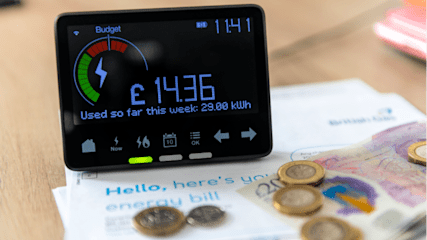Energy bills set to rocket by a massive £693/year for millions as new price cap is confirmed — should you still 'do nothing' or is now the time to fix?

Energy bills will rise by a typical £693/year for 22 million households in April, as regulator Ofgem confirmed the steepest ever increase to the new price cap level this morning. We've been warning this huge rise was coming due to record gas prices firms are paying, and unfortunately, due to the dire state of the market, most can't save by switching right now.
The increase is down to Ofgem raising the price cap on standard and default tariffs by 54%. On "typical" energy use, this means the price cap will rise from £1,277/year to £1,971/year from Friday 1 April.
More than 60% of households are on these standard tariffs – you'll be on one if you've never switched, your fixed deal ended and you didn't switch again, or if your provider went bust and you were moved across to a new supplier.
While there's little you can do to avoid the hikes, with no cheap deals for switchers, the Government announced this morning that over £9 billion in state-backed loans will be made available in England, Scotland and Wales, with households set to be given up to £350 to help with their energy bills this year.
The rise in the level of the price cap comes as no surprise, and we've been warning of a substantial hike for months due to record wholesale costs (what firms pay). It takes the price cap to its highest ever level since its January 2019 introduction, adding a massive £693/year to the average household's bills – with most suppliers typically pricing their standard tariffs within a pound of the cap.
And bear in mind, the new cap level isn't the maximum anyone will pay. The price cap sets a limit on the rates you pay for each unit of gas and electricity, so if you use more, you'll pay more. Under the new cap, the rates on average (it varies by region) are about 7p/kWh for gas, with a standing charge of 27p per day. For electricity, it's about 28p/kWh, with a standing charge of 45p per day.
According to the regulator, the sharp rise is all down to a record rise in global gas prices over the last six months, with wholesale prices quadrupling in the last year.
Ofgem has also announced a £708/year increase to the cap for four million households on prepay tariffs – to £2,017/year for a typical household.
For more info on how the cap works, see our Energy price cap FAQs guide or, if you're struggling with the energy hikes, see our new What to do if you're struggling to pay your energy bills? guide.
Martin: Most should DO NOTHING, stick on the price cap and don't fix
Martin Lewis has warned that most households should continue to do nothing with their energy and should stick with the price cap. Watch Martin's video explainer from the latest episode of The Martin Lewis Money Show Live below.


The clip above has been taken from The Martin Lewis Money Show Live on Thursday 3 February 2022, with the permission of ITV Studios. All rights reserved. You can turn on subtitles by selecting the keyboard image at the bottom right of the video. You can also watch the full episode on the ITV Hub.
There are still no open market tariffs that are cheaper than the new price cap – so for most, it's likely still best to do nothing
The market's cheapest deal that you can switch to right now is £2,150/year – that's considerably higher than the new price cap. At that rate, fixing now is still unlikely to be worth it.
If we assume the price cap stays the same after the 1 April hike, you'd have to find a cheap fix that's no more than 44% costlier than your current price-capped tariff.
Yet we know that the cap will change again in October, and if wholesale energy prices stay where they are now, there would likely be another rise of around 20%, to more than £2,300/year on typical use. Based on this, you'd need to find a fixed deal now that's no more than 59% more expensive than your current price-capped tariff, to make it worth considering.
Bear in mind we don't have a crystal ball here, and we've had to make a number of assumptions when calculating this, but these percentages should work as a rule of thumb.
Right now, the market's cheapest fix is on average 68% more than the current price cap, but it's possible you could get offered something cheaper than this from your current supplier, as we've seen some suppliers offer slightly more competitive deals to existing customers.
Also, do be aware suppliers are making a loss on everyone on price-capped tariffs and having to sell energy under cost price, so they are pulling out all the stops trying to get people on to more expensive fixed deals. Don't fall for the marketing waffle and feel compelled to sign up right away, instead make sure you do your own calculations first.
If you want to do an energy comparison, the new price cap rates from 1 April won't be factored in yet
If you do want to compare your energy tariff, be aware that for those on standard tariffs, when you compare in our Cheap Energy Club (and on other sites), we need to use the current cap as a base for comparison as we don't yet know providers' new rates under the cap from April. That means we can't factor the upcoming hikes into comparisons, so you need to add 54% to your current costs, and compare that to the estimated annual cost of other tariffs (ignore the 'savings' figures).
If you're currently on a fixed deal, you won't be affected by these hikes until your deal ends and you roll on to a standard tariff.
Beware of energy firms pushing mega-expensive fixed deals
Energy firms will likely use the incoming price hikes to tempt you to switch. Suppliers have been making a loss on everyone on price-capped tariffs, having to sell energy under cost price, so they've been pulling out all the stops trying to get people on to more expensive fixed deals. Remember, your rates won't change until April, and until then you will be on the cheaper cap. Don't fall for the marketing waffle and feel compelled to sign up right away, instead make sure you do your own calculations first.
Struggling to pay your bill? There's additional help available
The massive upcoming hike to the price cap will pile on the pressure on many households already struggling with rising costs. While the Government support announced today may help some, it likely won't cover the full cost of the hikes and it's likely energy bills will remain high for some time.
If you're having issues paying for your gas and electricity, our new Struggling with energy bills? guide details all the help available, including when to speak to your provider, what grants and help schemes you may be able to access, how to get free energy and debt advice, freebies and grants to improve your home's energy efficiency, ways to cut usage and more.
How does the price cap work?
The price cap sets a limit on the maximum amount suppliers can charge customers on standard tariffs for each unit of gas and electricity you use, and sets a maximum daily standing charge (what you pay to have your home connected to the grid).
As the cap limits the price providers can charge for each unit of gas and electricity, if you use more energy, you'll pay more, use less and you'll pay less.
The price cap is currently reviewed twice a year, with changes coming into effect in April and October. However, we're expecting Ofgem to announce major changes later this week – see our Price cap explained guide for news when we get it.
What does Ofgem say?
Ofgem chief executive Jonathan Brearley said: "We know this rise will be extremely worrying for many people, especially those who are struggling to make ends meet, and Ofgem will ensure energy companies support their customers in any way they can.
"The energy market has faced a huge challenge due to the unprecedented increase in global gas prices, a once in a 30 year event, and Ofgem's role as energy regulator is to ensure that, under the price cap, energy companies can only charge a fair price based on the true cost of supplying electricity and gas.
"Ofgem is working to stabilise the market and, over the longer term, to diversify our sources of energy, which will help protect customers from similar price shocks in the future."





















